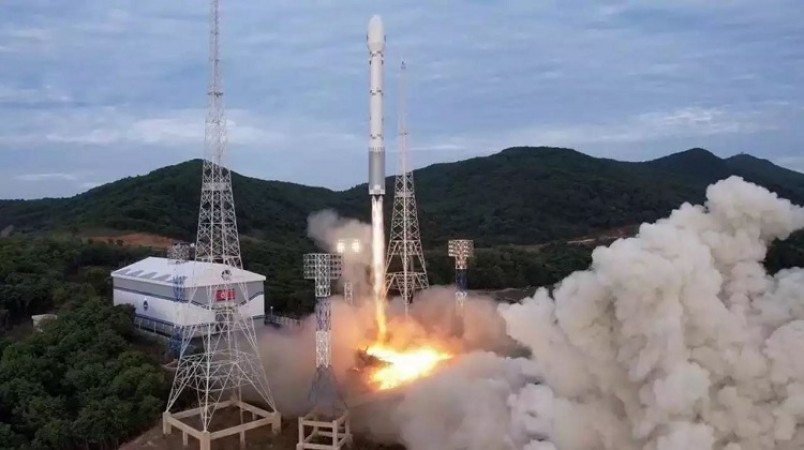
Seoul - In a persistent display of its determination amidst ongoing tensions with the United States, North Korea announced the successful placement of a spy satellite into orbit, marking its third attempt this year. The nation's move underscores its commitment to establishing a space-based surveillance system, despite international disapproval.
The claim made by North Korea on Wednesday regarding the satellite's deployment awaits independent verification. Experts cast doubt on the satellite's advanced capabilities for military reconnaissance. However, the launch has elicited strong condemnation from the United States and its allies due to the UN's prohibition on North Korea conducting satellite launches, viewing them as veiled tests for missile technology advancement.
North Korea's space agency declared that its latest carrier rocket, named "Chollima-1," effectively positioned the Malligyong-1 satellite into orbit on Tuesday night. This success occurred approximately 12 minutes after liftoff from the country's primary launch center.
The National Aerospace Technology Administration defended the launch as North Korea's legitimate right to fortify its self-defense capabilities. Emphasizing the satellite's role in enhancing the nation's preparedness against perceived threats, the agency stated that the spy satellite would aid in monitoring South Korea and other regions. Leader Kim Jong Un purportedly oversaw the launch and extended congratulations to the scientists and personnel involved. North Korea revealed plans to launch multiple additional spy satellites for improved surveillance purposes.
Adrienne Watson, spokesperson for the US National Security Council, strongly denounced North Korea's actions, asserting that the launch heightens tensions and jeopardizes regional and global security. Washington contends that the technologies employed are directly linked to North Korea's intercontinental ballistic missile program.
South Korea responded by signaling its intention to suspend a 2018 inter-Korean tension-reduction agreement and resume frontline aerial surveillance of North Korea. Japanese Prime Minister Fumio Kishida labeled the launch "a serious threat affecting public safety" and lodged a stern protest with North Korea.
Reportedly, the rocket carrying the satellite traversed from the Korean Peninsula's western coast over Japan's Okinawa island towards the Pacific Ocean. Consequently, the Japanese government briefly issued a J-Alert missile warning for Okinawa, urging residents to seek shelter.
A spy satellite stands as a crucial military asset desired by Kim Jong Un to modernize North Korea's weaponry in response to perceived escalating threats from the US. Prior attempts earlier this year by North Korea faced failures due to technical glitches.
The delay in the recent launch is believed to stem from North Korea seeking technological assistance from Russia for its spy satellite program, according to South Korean officials. Both North Korea and Russia, facing increasing global isolation, have intensified efforts to strengthen their ties in recent months. Speculation arose regarding a potential weapons deal following Kim's visit to Russia's Far East in September, where he met President Vladimir Putin and visited strategic military sites.
Allegations have surfaced suggesting a deal involving North Korea supplying conventional arms to bolster Russia's depleted ammunition reserves amid its conflict with Ukraine. In return, North Korea reportedly seeks Russian support in enhancing its nuclear and military programs. Denying these claims, both countries refute allegations of engaging in arms trading that would contravene UN sanctions against North Korea.
Leif-Eric Easley, a professor at Ewha University in Seoul, commented that Tuesday's launch raises significant queries about the satellite's actual capabilities for reconnaissance, along with suspicions of potential technical assistance from Russia.